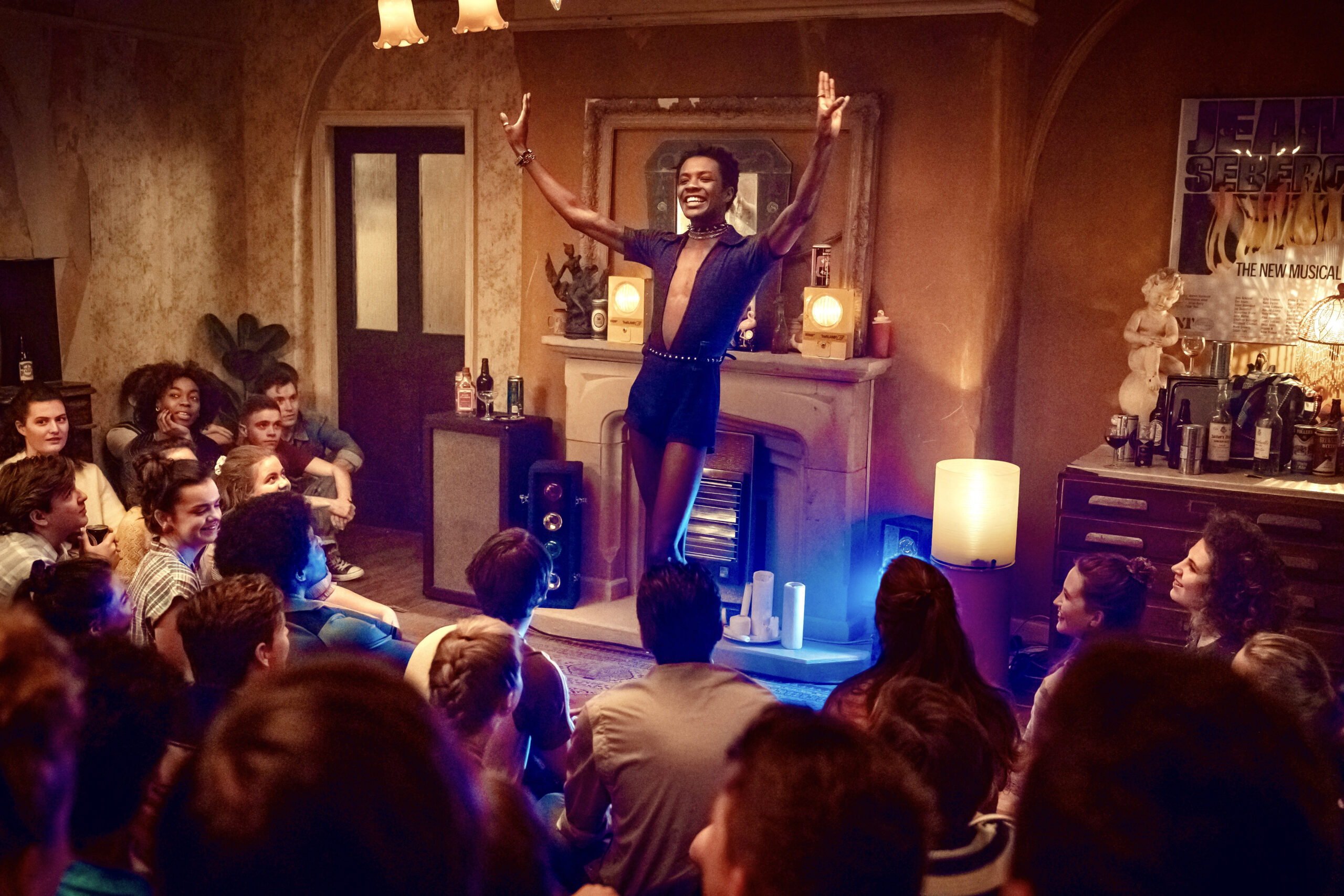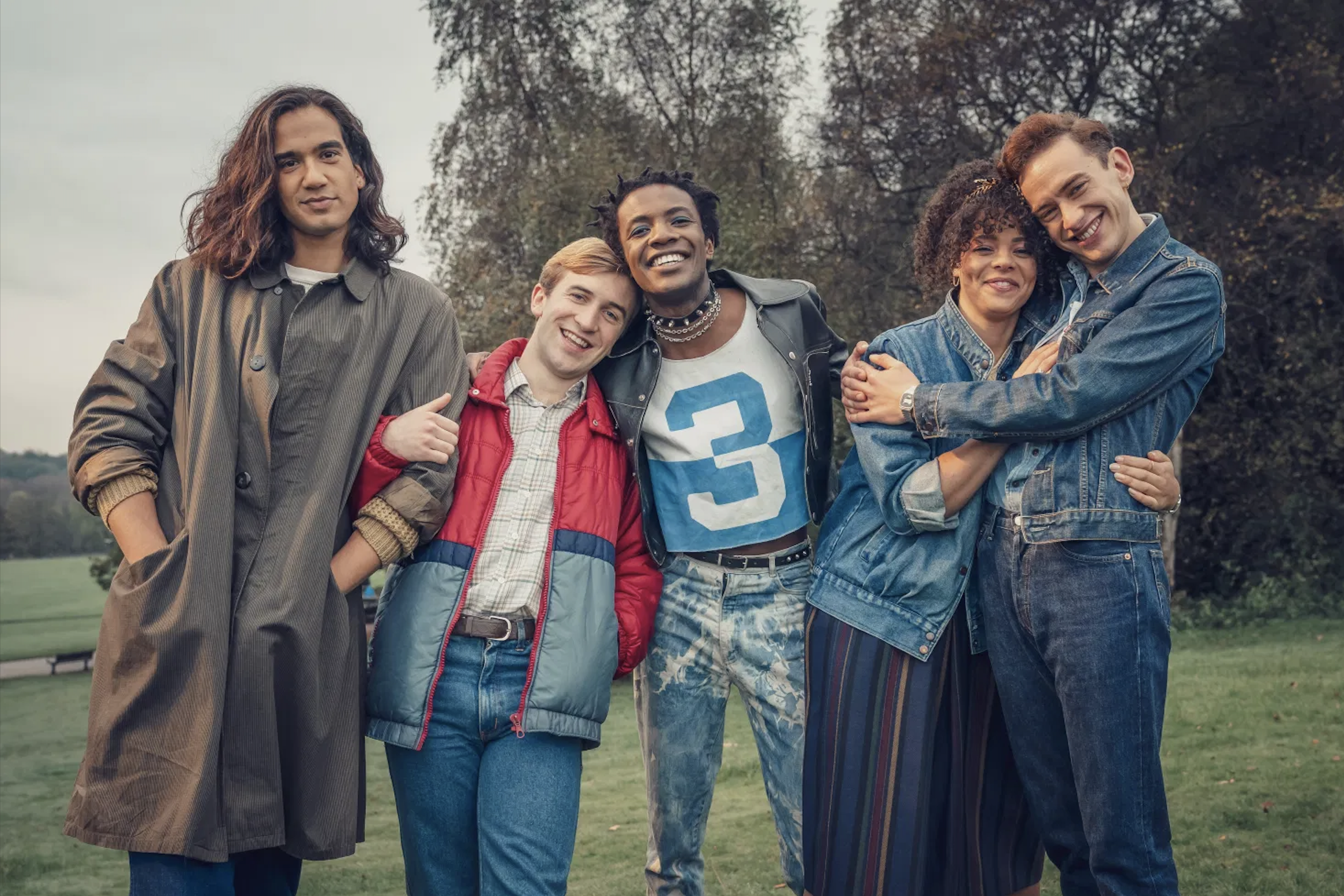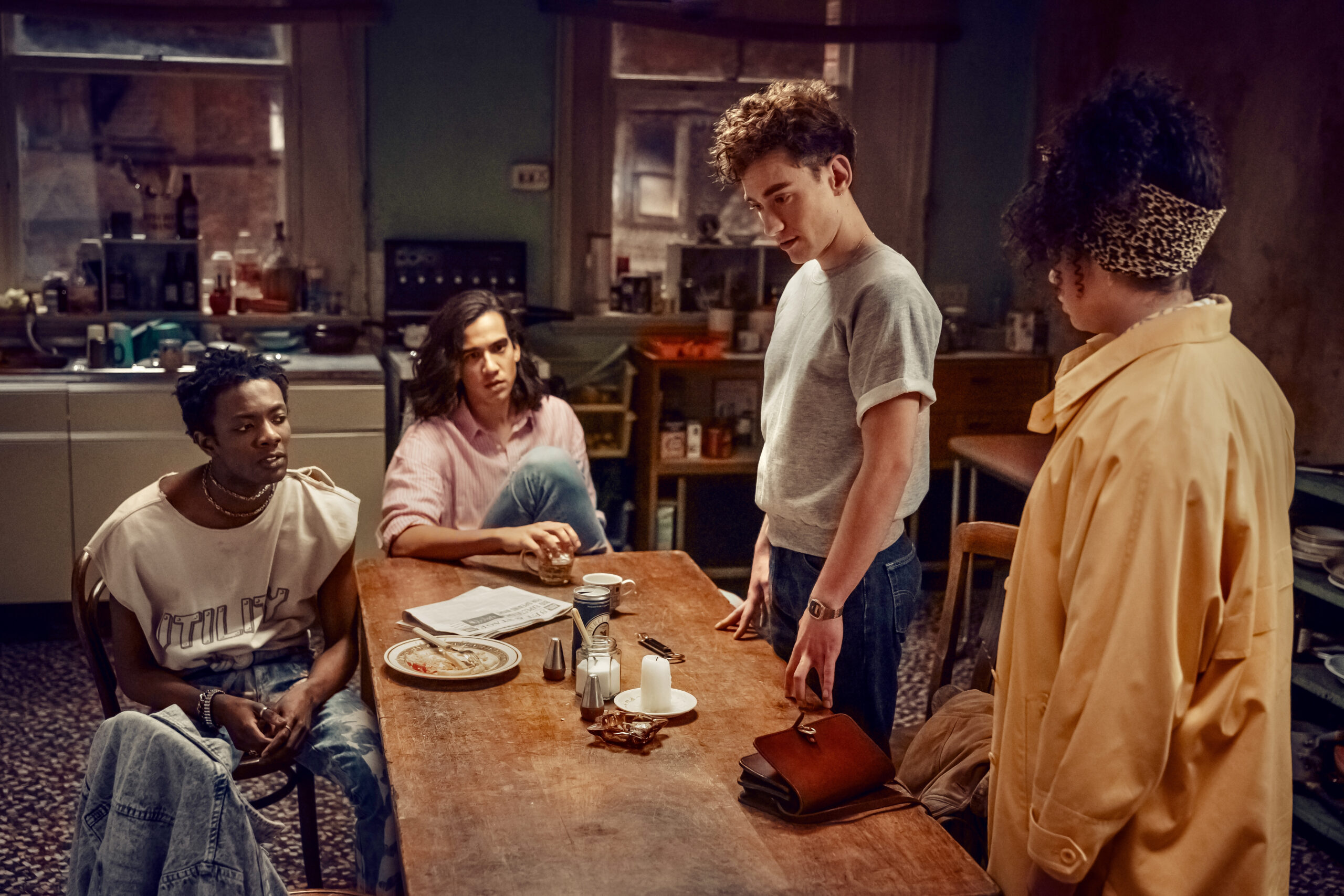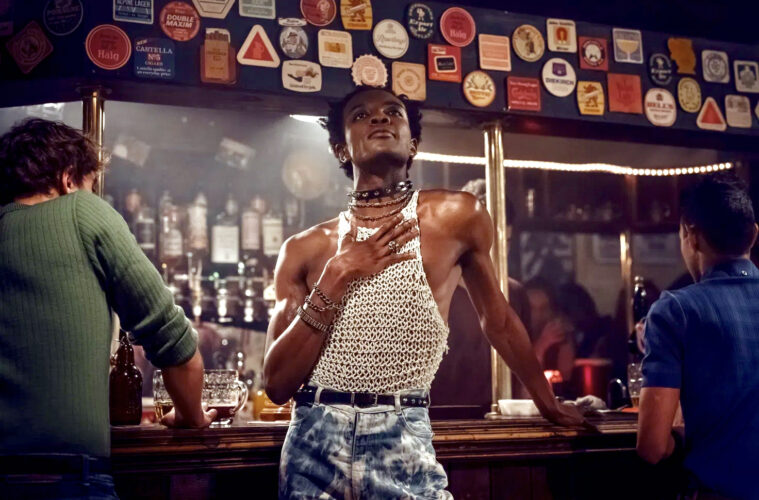Omari Douglas plays the bold and vibrant Roscoe on It’s A Sin, Russell T Davies’ latest limited series. In this interview, Omari tells us about the show’s educational relevance, as well as the chemistry he felt with his castmates, and what he hopes for the series.

Ben Blackall/HBO Max
Roscoe happens to be Omari’s first major television role, although he has a much more extensive background in theatre, participating in plays such as Peter Pan, Jesus Christ Super Star, and Wise Children.
It’s A Sin follows Roscoe’s group of queer friends across the decade of the 80s, since the very beginning of the AIDS epidemic in the UK, as they try to survive those times full of homophobia, threats, and negligence. When doing so, each of the protagonists affirms their individuality and how wonderful they are as human beings.
Alongside Douglas, Olly Alexander (vocalist of the band Years & Years) plays the rebellious Ritchie, Lydia West (appeared on Years and Years, another one of Russell’s productions) plays the nurturing Jill, and Callum Scott Howells plays the sweet Colin. The group of friends is abruptly forced to deal with the epidemic early in their youth, affecting and stopping their lives and aspirations in many ways. The show itself is a reflection of what the creator, Russell T Davies, went through himself during that time.
Roscoe’s story begins when he decides to escape his house as a teenager due to his conservative family’s plans to send him away to ‘treat his condition’ since they wrongly believed his queerness could be cured.

Ben Blackall/HBO Max
In a recent interview with us regarding the series, Lydia West talked about the importance of a chosen family especially for the queer community, which their friend group portrays beautifully. We see them growing closer across the decade and becoming their own chosen family, in spite of it all. In spite of all the repression and negligence faced by the gay community, ignored by both society and governments all around the globe. Their story, however, is not only one of resistance and dangers but also one of love and support, and its characters feel real due to their flaws, dreams, and genuine desires.
The creator’s intention was to remind the public of those many lives that have been lost but also to celebrate them, by depicting a harsh yet raw reality that happened only less than 40 years ago, which is not that far away really.
In our interview with Omari, we delve deeper into the show’s educational relevance, his relationships with his castmates, and the series’ potential.

Ben Blackall/HBO Max
Read the interview below (or watch the entire video interview on our YouTube Channel).
This has been the first British portrayal of the AIDS crisis and also your first onscreen performance. Between so many interviews and events, how are you coping with having such busy days now that the series is gaining even more traction with the release in North America?
Oh, well, it feels nice to be busy, but I think what’s been really nice as well is that, because the show is getting so much traction, we’ve been able to spread a quite profound and really important message, which is trying to raise awareness of the issues that do come up in the show and it’s just great that we’ve got the platform to do that and that the show is giving a platform to other people alongside the core cast. There’s just so many brilliant people like Nathaniel Hall and Jill Nalder and they’ve had the chance to speak out about their experiences and they’re really important and it’s simple and the people get to hear them as well, so it’s been nice to just enjoy that all, support each other, which is really nice as well.
Your character, Roscoe, demonstrated courage and growth from the very beginning, what was your favourite thing about him? What did he teach Omari?
Roscoe definitely taught me how to be a little bit more fearless. I think you see in the show that he is sort of unapologetic in the way that he lives his life, and he doesn’t let anyone question the way that he lives and the way that he expresses himself like he’s all about just being truthful to himself. I guess because he spent so much time living under the values of other people, you know, most significantly his family. I think Roscoe represents a message that I think a lot of people can be inspired by, which is just to be yourself. I think we are so used to pleasing people or feeling that we need to meet the needs and requirements of others and, actually, life is just more enjoyable when you can just be yourself and live as you live, just fully embrace yourself and I think that’s what Roscoe does. He fully embraces himself and he is innovative and creative within and that’s really inspiring to me.
There is a clear disparity between the data and media portrayals of queer HIV-positive men. Even if the HIV story was told from other parts of the world, there has been a lack of Black characters at the forefront. They haven’t been allowed visibility even in recent times. How does it feel to trailblaze? Was the responsibility inspiring or intimidating?
Well, there has tended to be an erasure of black experiences in both instances really, and it’s meant that we’ve had to rely on a lot of people to do a lot of the groundwork to make sure that the black experience doesn’t get lost amidst the mainstream portrayal of these things, whether that is in data or whether it’s in the media. And, so, I don’t know, I mean I’m definitely aware of my platform and my presence as a black queer person telling a story about another black queer person.
As fictional as Roscoe might be, he sort of represents a lot of facets in the community and of course, I also know that Roscoe’s experience isn’t the only experience that defines black queer and gay stories, but there are so many people who will probably seek refuge in his story or just in the telling of his story. So, I’m aware of that and it’s a privilege to be able to do that and I just had to take it in my strides. I completely, fully took it in my stride, and I put the onus on me to make sure that I went out and did the work as well so and that was really, really, really important to me.
Considering you are part of a younger generation than Roscoe and his friends, how did this shameful discourse about HIV affect you in your youth? What do you think will be the impact of the series on younger queer generations?
I mean, obviously, you’ve seen the show, there’s a reference to Section 28 which was a piece of legislation that was passed through the government which prevented any sort of acknowledgement of homosexuality in the curriculum or in any kind of educational institution. And that was repealed in 2003 and I would have been about 8 or 9 so by the time that I was going through all the later stages of my education, I think that there was definitely like a lasting effect of that law that, you could sort of say, bled into my education and my going through school.
I think the stigma is always just sort of present. I mean, for a long time the word “gay” was kind of chucked around the playground as just sort of like a general insult to people. I kind of grew up with it as it is this sort of trivial word that would get chucked around. It’s hard when you’re growing up through it because I didn’t have the language to challenge it or to just really understand what’s going on. I guess it’s only now that I look back on it and I go ‘Wow. Maybe there’s a lot that we need to change about the education system because, I guess, a lot of the reason why people are treated like that in those environments is because people don’t acknowledge queerness as just being a part of everyday life, it’s very normal’.
It’s just constantly been seen as taboo or pushed to one side and I think the more that we can put it into every day, that being, through things like media, and then I guess the more we can– I don’t know, it’s probably quite an idealistic view but I just think that’s sort of the path to a more open-minded society and just to allow kids to be kinder to one another, ’cause I think that’s what’s missing for queer kids, a kindness shown to them when they’re going through that stuff and they’re trying to understand who they are. And I’m sure a lot of kids will be watching It’s A Sin and might be watching it in secret and, if they are, then hopefully they find some kind of like solace in that and know that things will be better. It’s an education as well, I think it’s important that we all kind of learn where we came from, whose shoulders we’re standing on.
Yeah, I was just going to say that; if you thought the series was relevant from an educational point of view and, I think we both do, so, do you believe the series is already helping to change the public perspective on this stigma of being HIV positive?
I like to think so! I hope it’s not just a moment in time, I hope that the conversation continues, that people’s perceptions have genuinely been changed, or challenged. It’s been amazing, the conversations that I’ve had with people personally and people have said to me “I lived through that time and I didn’t have any kind of consideration for my neighbour or anything like that, anyone who could have been going through this”. It was put to one side, but then equally they also say that they might have been oblivious to it all and kind of like actively so, ’cause they thought it had nothing to do with them, but I think it was a universal issue. So the fact that people have been moved in that sense is great, it kind of means that it’s just more than a bit of telly that you’re going to watch and forget about the next day. It’s gonna stay with people.
You and your castmates have made clear there’s a strong and lovely bond between you all, can you tell us how did it feel to work with people you connected so much with?
It’s all I want when I work, like, I always want to work with people who are nice and kind and, you know, they inspired me, all the way through. They’re so amazing, amazing, amazing you know, as people and creatively and those are the things that I really value as an actor like I always rely on others because it is about everyone else, it’s not really just about you, so that just came naturally with this group of people. We all had a connection to the work, and we were really passionate about it and there was a chemistry and we just let that chemistry sort of transcending. And people have been appreciating our friendship on the screen, and off, and I just love that ’cause it’s nice that people feel like that they wanna be in our gang and I love that! We just had the best time filming the show and it’s just nice that we’ve been able to kind of share that warmth with everyone. I feel like it’s kind of what everyone needs right now.
Finally, if Roscoe could have his own standalone series, what would it be about?
Oh my God! Well, I guess it’s sort of would-be where he goes from the end of the narrative that you see in the show. I feel like that he would definitely still be doing amazing things on the scene, I don’t know whether he would be working at a bar, but, you know, he might still be! He might be running you know all the clubs in London! I don’t know, I just feel like he definitely is one of those people who leave a real mark on that part of the gay scene sort of like culturally. I hope that he’s able to stay true to himself ’cause that’s why I loved him in the first place and just go and just inspire more like queer kids to do their thing.
The entire five-part season of It’s A Sin is available on Amazon Prime Video for Canadian viewers and on HBO Max for the United States.


